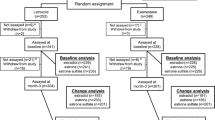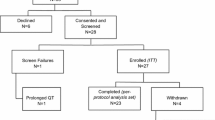Abstract
-
▴ Exemestane is a steroidal agent which causes inactivation of the aromatase enzyme by binding irreversibly to the substrate binding site.
-
▴ Oral exemestane 25 mg/day inactivates peripheral aromatase activity (R-98% inactivation) and reduces basal plasma estrone, estradiol and estrone sulphate levels by 85 to 95% in postmenopausal women with advanced breast cancer.
-
▴ Phase II trials indicate that oral exemestane 25 mg/day is an effective second- or third-line agent in the treatment of postmenopausal women with advanced breast cancer (achieving an objective response in up to 28 and 26% of patients, respectively).
-
▴ Results from a phase III trial indicate that exemestane achieves a similar objective response rate to megestrol as a second-line therapy; however, exemestane achieved a significantly longer duration of overall success, time to disease progression and survival time.
-
▴ Exemestane is at least as well tolerated as megestrol, but is associated with significantly fewer bodyweight changes, mainly bodyweight gain (≥10%). Other common adverse events are hot flushes, nausea and fatigue.
Similar content being viewed by others
References
di-Salle E, Giudici D, Briatico G, et al. Novel irreversible aromatase inhibitors. Ann N Y Acad Sci 1990; 595: 357–67
di-Salle E, Giudici D, Ornati G, et al. 4-Aminoandrostenedione derivatives: a novel class of irreversible aromatase inhibitors. Comparison with FCE-24304 and 4-hydroxyandrostenedione. J Steroid Biochem Mol Biol 1990 Nov 20; 37: 369–74
Giudici D, Ornati G, Briatico G, et al. 6-Methylenandrosta-1,4-diene-3, 17-dione (FCE 24304): a new irreversible aromatase inhibitor. J Steroid Biochem 1988; 30: 391–4
di-Salle E, Briatico G, Giudici D, et al. Novel aromatase and 5 α-reductase inhibitors. J Steroid Biochem Mol Biol 1994; 49: 289–94
Zaccheo T, di-Salle E. Effect of the irreversible aromatase FCE 24304 on DMBA-induced mammary tumors in ovariectomized rats treated with testosterone. Cancer Chemother Pharmacol 1989; 25: 95–8
Evans TR, di-Salle E, Ornati G, et al. Phase I and endocrine study of exemestane (FCE 24304), a new aromatase inhibitor, in postmenopausal women. Cancer Res 1992; 52: 5933–9
Geisler J, King N, Anker G, et al. In vivo inhibition of aromatization by exemestane, a novel irreversible aromatase inhibitor, in postmenopausal breast cancer patients. Clin Cancer Res 1998 Sep; 4: 2089–93
Johannessen DC, Engan T, di-Salle E, et al. Endocrine and clinical effects of exemestane (PNU 155971), a novel steroidal aromatase inhibitor, in postmenopausal breast cancer patients: a phase I study. Clin Cancer Res 1997 Jul; 3: 1101–8
Paridaens R, Thomas J, Wildiers J, et al. Safety, activity and estrogen inhibition by exemestane in postmenopausal women with advanced breast cancer: a phase I study. Anticancer Drugs 1998 Sep; 9: 675–83
Castelli MG, Cocchiara G, Zurlo MG, et al. Excretion balance and absorption of 14C-exemestane in animals and humans [abstract no. 73]. J Endocrinol Invest 1994; 17 (3 Suppl. 1):76
Poggesi I, Allievi C, Strolin Benedetti M, et al. Relative bioavailability and pharmacokinetics of two different formulations of exemestane, a new aromatase inhibitor [abstract no.76]. J Endocrinol Invest 1994; 17 (3 Suppl. 1): 79
Persiani S, Poggesi I, Cicioni P, et al. Pharmacokinetics of repeated low-doses of exemestane (1, 2.5, 5 and 10mg) in postmenopausal healthy volunteers, [abstract no. 952]. Eur J Cancer 1995; 31 Suppl. 5: sl98
Poggesi I, Jannuzzo MG, di-Salle E, et al. Effect of food and formulation on the pharmacokinetics (PK) and pharmacodynamics (PD) of a single oral dose of exemestane (Aromasin™, EXE) [abstract no. 741]. Proc Am Soc Clin Oncol 1999; 18: 193a
Cocchiara G, Allievi C, Berardi A, et al. Urinary metabolism of exemestane, a new aromatase inhibitor, in rat, dog, monkey and human volunteers [abstract no. 75]. J Endocrinol Invest 1994; 17 (3 Suppl. 1): 78
Thürlimann B, Paridaens R, Serin D, et al. Third-line hormonal treatment with exemestane in postmenopausal patients with advanced breast cancer progressing on aminoglutethimide: a phase II multicentre multinational study. Eur J Cancer A 1997 Oct; 33: 1767–73
Jones S, Chang A, Lusch C, et al. A phase II confirmatory study of antitumour efficacy and safety of exemestane as third-line hormonal treatment of postmenopausal patients with meta-static breast cancer refractory to tamoxifen and megace™ [abstract no. 439]. Breast Cancer Res Treat 1998; 50(3): 305
Lonning PE, Bajetta E, Murray R, et al. A phase II study of exemestane in metastatic breast cancer patients failing nonsteroidal aromatase inhibitors [abstract no. 435]. Breast Cancer Res Treat 1998; 50(3): 304
Jones S, Vogel C, Fehrenbacher L, et al. A phase II study of antitumor efficacy and safety of exemestane as third-line hormonal treatment of postmenopausal patients with metastatic breast cancer refractory to tamoxifen and Megace™ [abstract no. 64p]. Ann Oncol 1998; 9 Suppl. 4: 13
Kvinnsland S, Anker G, Dirix LY, et al. Activity of exemestane, an irreversible, oral, aromatase inhibitor in metastatic postmenopausal breast cancer patients failing tamoxifen [abstract no. 408]. Eur J Cancer 1998 Sep; 34 Suppl. 5: s91
Jones S, Belt R, Cooper B, et al. A phase II study of antitumour efficacy and safety of exemestane as a second-line hormonal treatment of postmenopausal patients with metastatic breast cancer refractory to tamoxifen [abstract]. 21st Breast Cancer Symposium; 1998 Dec 12–15; San Antonio, Texas
Kaufmann M, Bajetta E, Dirix LY, et al. Survival advantage of exemestane (EXE, Aromasin® over megestrol acetate in postmenopausal women with advanced breast cancer refractory to tamoxifen: results of a phase III randomised double-blind study [abstract no. 412]. Proc Am Soc Clin Oncol 1999; 18: 109a
Kaufmann M. Aromasin™ versus Megace™: improved outcomes [abstract]. In: Proceedings of 1st Milan Breast Cancer Conference; 1999 Jun 16; Milan: 6–7
Tedeschi M, Kvinnsland S, Jones SE, et al. Hormonal therapy in breast cancer and predominant visceral disease: effectiveness of the new oral aromatase inactivator, Aromasin™ (Exemestane), in advanced breast cancer patients having progressed on antiestrogens [abstract]. In: Proceedings of European Cancer Conference: 1999 Sep 12–16: Vienna
Kaufman M. Exemestane versus megestrol acetate in postmenopausal patients with metastatic breast cancer, failing tamoxifen: a phase III, double-blind, randomized, parallel-group, comparative study. Pharmacia & Upjohn, Milan, 1998. Report no.:94-OEXE-018. (Data on file)
Author information
Authors and Affiliations
Corresponding author
Rights and permissions
About this article
Cite this article
Scott, L.J., Wiseman, L.R. Exemestane. Drugs 58, 675–680 (1999). https://doi.org/10.2165/00003495-199958040-00007
Published:
Issue Date:
DOI: https://doi.org/10.2165/00003495-199958040-00007




